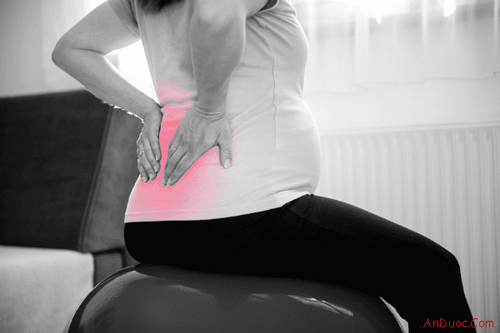This is an automatically translated article.
The article is professionally consulted by Doctor Department of Obstetrics and Gynecology, Vinmec Hai Phong International General Hospital.
In the 34th week, fetal weight and height increase close to birth weight, organ systems (digestive, respiratory, ...) have been completed, testes begin to move down the scrotum , sex hormones are produced to promote the development of sex organs in preparation for the stage of childbirth.
1. Fetal development at 34 weeks
At 34 weeks, the fetus has weighed about 2.2 kg, equivalent to a large pineapple and is about 45.3 cm long, measured from the top of the head to the bottom.
Testicles move to the scrotum: The testicles have been formed in the abdomen and are in the process of moving to the scrotum. In about 3-4% of boys, the process of moving the testicles to the scrotum takes longer. So don't worry if your baby boy is born without his testicles descending into the scrotum, they will appear at least 1 year before birth.
Sex hormone production: At this time, both boys and girls are producing a lot of sex hormones, which would explain why genitals may appear large and swollen at birth and in the case of boys, why the scrotum may appear dark pigmented in the first few weeks after birth.
Thickening of the protective wax layer: With just a few weeks until the big day, the vernix - the white waxy coating that protects the baby's skin from amniotic fluid and provides mucus that lubricates for delivery - is thickening right in time to give birth.
Details of fetal development week by week, every parent should learn:
Complete digestive system: The digestive system has been completed allowing the baby to be ready to absorb breast milk when born. Most of the other major organs - the respiratory and nervous systems - are almost able to function on their own. The baby may have turned head-down, ready to be born. The space in the uterus is getting narrower, the mother can feel the baby's elbows or knees moving in the abdomen.
Central nervous system maturation: The baby's central nervous system along with the lungs are in the process of maturation. Babies born between 34 - 37 weeks with no other health problems usually indicate early maturation of these organs.
Nails appear: Within 1 week of development, after 33 weeks, baby's nails have finally reached the fingertips.
Trắc nghiệm: Bạn có hiểu đúng về dấu hiệu mang thai sớm?
Các dấu hiệu mang thai sớm không phải chỉ mỗi trễ kinh mà còn có rất nhiều dấu hiệu khác như xuất huyết âm đạo, ngực căng tức,… Điểm xem bạn biết được bao nhiêu dấu hiệu mang thai sớm thông qua bài trắc nghiệm này nhé!
2. New changes in mother at 34 weeks of pregnancy
The mother's uterus continues to expand. At 34 weeks pregnant, you are also seeing about 5 inches protruding above the navel.
At this time, the eyes of pregnant mothers do not work as well as usual. That's because of the effects of pregnancy hormones - it can also affect the digestive tract and ligaments. Not only can vision be blurred these days, but reduced tear production can make your eyes dry and uncomfortable, especially if contact lenses are worn. What's more, an increase in fluid behind the eye can cause contact lenses to change shape, making some women's nearsightedness or farsightedness worse. However, these changes are only temporary. Your eyes will return to normal after giving birth. But keep in mind that some more serious vision problems can be a sign of preeclampsia, so be sure to mention any vision changes to your doctor.

3. Symptoms of pregnancy week 34
Bloating and Gas As the third trimester approaches the end, you may feel bloated. Worrying only makes those uncomfortable feelings worse - you tend to swallow more air when stressed. So try to relieve stress by breathing deeply through your nose and out for 1-2 minutes a day.
Constipation The larger the fetus, the larger the size of the fetus can compress the colon causing constipation. Therefore, pregnant women should enhance their diet with some dried fruits, fresh fruits, vegetables and whole grains. If there is no improvement, you may need to resort to laxatives (even herbal ones). Consult your doctor before taking any medication.
Increased vaginal discharge As pregnancy progresses, pregnant women may notice increased vaginal discharge. That's caused by pregnancy hormones (especially estrogen) - they increase blood flow to the pelvic area and irritate the mucous membranes. Wearing underwear with breathable cotton lining can keep the genitals dry and limit odor.
Hemorrhoids Hemorrhoids occur when constipation persists. Symptoms can be reduced with Kegel exercises. This exercise can help strengthen and tone the pelvic and vaginal muscles, which can help in improving hemorrhoids.
Back pain The weight of the body during pregnancy shifts from the back to the abdomen, creating additional pressure and causing pain in the lower back. There are many solutions to treat back pain such as increasing light exercise, changing position to sit, sit or walk. Note, sitting in one place for too long can make your back hurt even more.
Leg cramps Leg cramps are the most common symptom at this stage, occurring due to the rapid increase in fetal weight, increased swelling and fatigue. If you have cramps, apply cold compresses, or stay in place and slowly straighten the dislocated joint.
Stretch marks If pregnant women have light-colored hair and a family history of stretch marks, they are more likely to develop stretch marks than someone with dark hair (or dark skin). This symptom can be minimized by keeping weight gain slow and steady.
Edema (swelling in the feet and ankles) As the fetus gets bigger, body tissues accumulate and retain fluid, and you may experience swelling in your ankles, feet and toes hand. Wearing comfortable sandals at the end of the workday can help soothe swollen toes.
Fast hair growth During pregnancy, hair will grow faster and shinier, but not only on the scalp, it can also grow in other places like cheeks, chin and back. Waxing is safe during pregnancy, ask for a formula for sensitive skin as skin is more sensitive at this time.
Shortness of breath As your belly gets bigger, your lungs will be able to fully expand, so you may feel a draft in your body, even after going to the bathroom. Sleeping on the left side can reduce shortness of breath at night.
Insomnia Insomnia during pregnancy can be caused by anxiety about the upcoming birth. Try lulling yourself to sleep with a warm bath and a glass of warm milk and reading or listening to music instead of watching TV or going online (those activities can keep you awake).
Colostrum leak As the due date approaches, the udder may leak colostrum - the yellow stream will be your baby's first drink. It may leak more than a few drops, but if it feels uncomfortable, you can use a nursing pad.
4. Health care for pregnant women at 34 weeks of pregnancy
Protect your eyes: By week 34, your eyes may feel drier and more sensitive than usual, so keep sunglasses and eye drops handy at all times.
Prenatal depression: Between 10 and 15% of women experience depression during pregnancy. Certain factors can put a pregnant woman at a higher risk of developing depression, such as uncomfortable pregnancy symptoms, anxiety, lack of care, etc. There's no shame in asking for help. Visit your doctor for advice; Some antidepressants are safe for use during pregnancy.

Don't eat too much food: Doctors often recommend that pregnant women eat a low-sodium diet during pregnancy. A moderate amount of salt (salt for seasoning, foods with a low salt content) really helps a woman's body regulate fluid in the body and significantly reduces the amount of sodium that is not good for the baby. However, keep in mind that too much salt is not good for anyone (pregnant or not) - and it can even worsen swelling. Some solutions such as limiting yourself to 1-2 soaks, skipping salty snacks, getting into the habit of tasting before sprinkling can regulate the amount of salt supplied to the body.
Boosts Health: A brisk walk, yoga class, swimming or jogging will increase blood flow and boost endorphins. Physical activity also helps pregnant women sleep better, which will also help combat daytime fatigue.
The last 3 months of pregnancy, especially from week 34 onwards, the health of both mother and baby needs to be closely monitored and checked. Pregnant women need:
Know the real signs of labor to get to the hospital in time, affecting the health of the fetus. Differentiate between amniotic fluid and vaginal discharge for timely treatment to avoid premature birth, fetal distress, and stillbirth. Be especially careful when bleeding in the last 3 months of pregnancy needs urgent emergency care to ensure the life of both mother and baby. Monitor the amount of amniotic fluid regularly and continuously. Monitor fetal weight in the last 3 months to assess baby's development and predict possible risks at birth. The special monitoring group is the same as the striker, and the fetal growth retardation needs to be closely monitored by the doctor and given appropriate indications. Distinguish between physiological contractions, labor contractions and mechanical pregnancy to get to the hospital in time. Maternity service package at Vinmec helps pregnant women's pregnancy become lighter and safer. During pregnancy, pregnant women will be examined by top doctors in the Obstetrics and Gynecology Department with high professional qualifications and experience, giving the best advice and treatment for the health of both mother and child. little.
For detailed information about all-inclusive maternity service packages, please contact the hospitals and clinics of Vinmec Health system nationwide.
Please dial HOTLINE for more information or register for an appointment HERE. Download MyVinmec app to make appointments faster and to manage your bookings easily.
Reference source: Webmd.com













